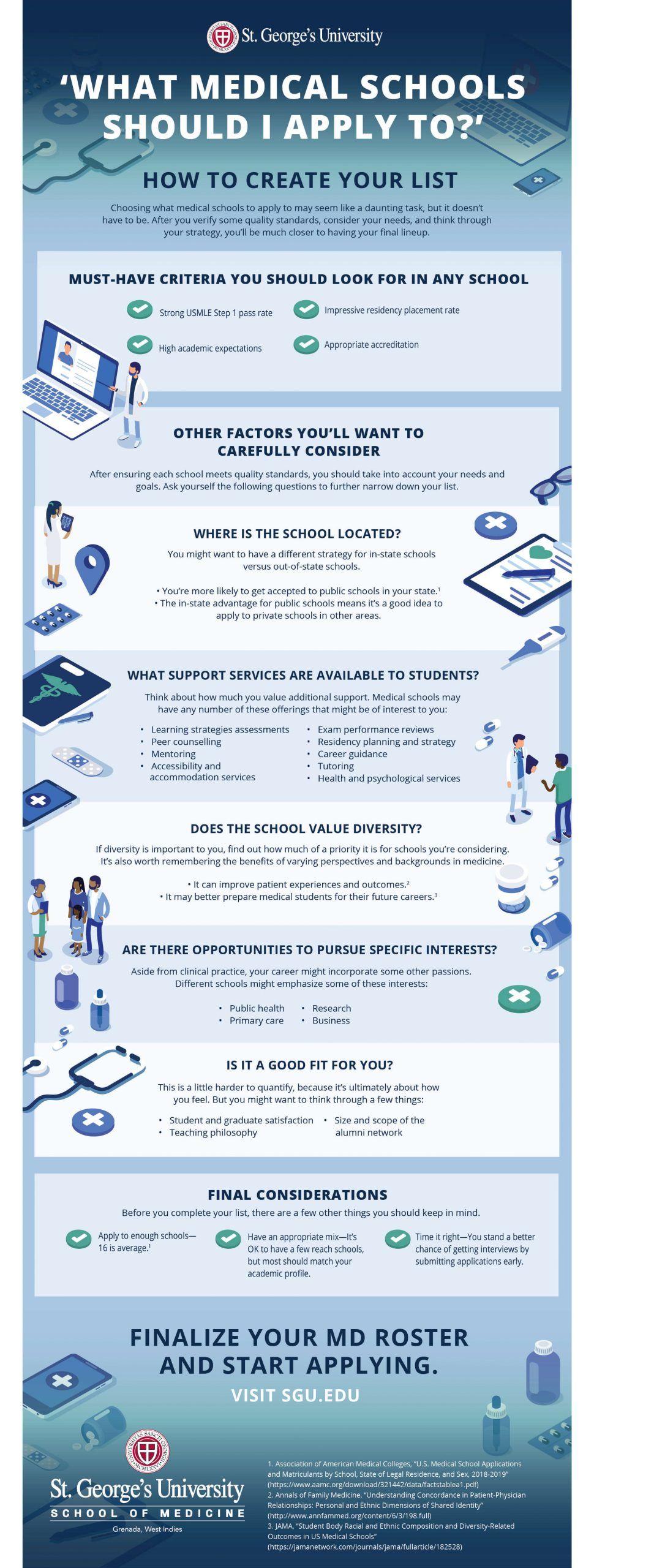If one of your goals has been to attend medical school and become a doctor, there are many factors to consider when devising your list of medical schools to apply to. As you get closer to the time when you need to take your MCATs and start the application process, you might be wondering what is the “right” number of applications.
To give yourself the best odds of becoming a doctor, it will serve you well to have a well-rounded list of medical schools. Figuring out what a balanced list looks like can be a little tricky, though. If you feel you still have questions, we created a list and infographic to help you sort through some common ones.

1. What are the residency success rates?
You’re probably well-aware that postgraduate training is an essential part of becoming a doctor. Therefore, it’s in your best interest to make sure you only apply to medical schools with a good track record for residency placements. You might start by asking programs what percentage of their students obtain a residency position. Note that St. George’s University School of Medicine has a 95% US residency placement rate for US graduates over the last five years.1
It’s also a good idea to find out which residency programs students match into to find out whether that school can help you achieve your goals. For example, aspiring surgeons should verify that graduates from a given program have successfully secured surgery residencies in locations where they could see themselves.
2. What percentage of students pass the USMLE Step 1?
Performing well on the United States Medical Licensing Examination (USMLE) Step 1 is essential for eventually obtaining a medical license, but it’s also important for securing a residency. In fact, a recent program director survey conducted by the National Residency Matching Program (NRMP) shows USMLE Step 1 scores are the most important factor for residency candidates.
To find out whether a program is adequately preparing students for licensing exams, consider how their pass rate compares to the overall landscape. In 2022, the exam was changed its scoring system to pass/fail. For 2024, performance data shows 89 percent of US and Canadian students taking the USMLE Step 1 for the first time passed. SGU students from the US and Canada taking the USMLE Step 1 for the first time 2019-2023 had an 84% pass rate.2
3. How strict are the academic standards?
A sharp mind and good problem-solving skills are necessary to effectively treat patients. This is why good medical schools look for candidates with strong academic metrics.
You can gain a sense of a school’s standards by comparing its average GPA and MCAT score to the bigger picture. The Association of American Medical Colleges (AAMC) reports students beginning medical school at a US program in 2018 had a median undergraduate GPA of 3.86 and a mean MCAT score of 512.
4. Is the school appropriately accredited
Be sure to check whether the international schools you’re considering are accredited by an agency approved by the World Federation for Medical Education (WFME). A medical school should have clear information about its accreditation and approvals.
5. What kinds of support services are available?
Though every medical school wants students to succeed, institutions vary on the breadth of support they provide. Some programs offer learning strategies assessments, organized study groups, tutoring, career guidance, assistance navigating the residency application process, and more. Other medical schools will have leaner offerings.
SGU’s Department of Educational Services (DES) plays a key role in supporting all students and faculty at SGU, as the academic and professional success of students is its primary goal. DES assists students individually and in groups as they prepare for course and licensure examinations. The Department works closely with all schools and programs to provide custom-tailored support regarding academic and non-academic issues.
It’s obviously up to you to determine how much additional support you want or need in a medical school. But it’s also worth noting medical school is rigorous. It’s not uncommon to run into some challenges along the way.
6. How diverse is the student body?
Diversity can greatly enhance your medical education equipping you with valuable experiences for your career as a physician. Furthermore, an institution that values this experience for its students, such as SGU, can instill the value in conveying complex medical ideas thoughtfully and accessibly to patients. Cultural competency can make the difference between a patient understanding their treatment plan or feeling confused and unsure. A research article in the “Annals of Family Medicine” journal finds that patients develop stronger relationships with their physicians when they perceive similarities like race and communication style. That can result in better care in the long run.
Some medical schools hope to address care gaps by educating a diverse student body. Using a holistic review process can help. And those budding MDs notice the difference. In fact, medical students report they feel better prepared to treat a diverse patient population when they attend a school with diverse student body, faculty, and staff.
7. Do you want to pursue specific professional interests?
While you may not know exactly what type of doctor you want to be, it’s a good idea to think about some broader interests you might want to pursue. Most medical schools wrap these types of pursuits into their mission. When talking to admissions officers, they may discuss opportunities in research, primary care, public health, or something else.
Think about what you’d like to emphasize in your career. It’s also worth considering whether you may want to pursue another degree while working toward your MD. You could, for example, pursue a Master of Public Health (MPH) degree at certain medical schools.
8. Is it a good fit?
Some elements that go into your final school selections are a little harder to quantify. You want to choose programs where you could see yourself excelling. SGU takes this to a new level allowing prospective students to “see” the campus through the SGU virtual tour and giving admitted students the opportunity to visit the campus though the SeeSGU program.
A few things you might consider: Does the teaching philosophy align with how you learn? Do the students seem happy? Do you value access to a large professional network?
Some final considerations
There are other things you need to keep in mind when compiling your final list. The applicant pool is obviously competitive, so applying to enough schools gives you a better chance of acceptance purely from a statistical standpoint. According to the AAMC, prospective med students apply to 16 med schools on average.
Students with slightly lower grades and test scores often apply to more schools, but you also need to make sure you’re targeting an appropriate mix. You can include some reach schools, but your list should be populated with programs that closely match your academic profile.
Lastly, it’s essential that you get your timing right. That means being as early as possible. Most experts will recommend that you submit applications in June, which will be more than a year ahead of when you plan to start medical school. However, some schools like SGU offer MD admissions in April, January, and August.
If you are looking to apply to an August start, it is better to get your applications early. If you apply later than everyone else, you could miss out on interview spots before anyone has even reviewed your materials.
Find your MD footing
Aside from some clear must-haves for you medical degree, choosing which med schools to apply to comes down to your personal preferences. Your best odds of gaining an acceptance letter may even be to think outside the US.
There are many international programs you might consider, including those located in the Caribbean. Take a look at our article The Truth About Caribbean Medical Schools: Debunking the Myths.
1 Average of 2021, 2022, 2023, 2024 and 2025 residency placement rates. Residency placement rate is defined as the total number of US students/graduates who obtained a US residency divided by the total number of US students/graduates who applied to a US residency program in a given year as of April 2025.
2 Total results from the five calendar years 2019-2023. First-time pass rate is defined as the number of US citizens/permanent residents or Canadian students passing USMLE Step 1 on their first attempt divided by the total number of US or Canadian students taking USMLE Step 1 for the first time within the given time range. In order to be certified to take USMLE Step 1, students are required to pass all basic sciences courses.
*This article has been updated from October 2019 to include current facts and figures.


